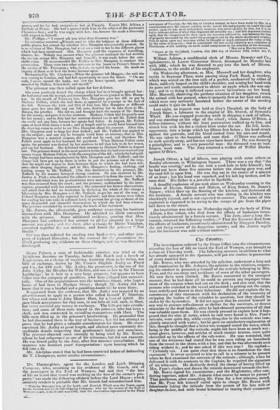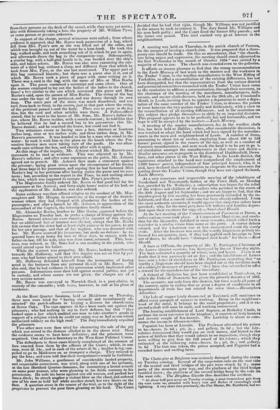Eljc 'Country.
The investigation ordered by the Home Office into the circumstances attending the loss of life on board the Earl of Wemyss, was brought to a close on Thursday week. T i
The following account, n addition to what has already appeared in the Spectator, will put our readers in possession of every material fact. Mr. Reeve, who was attended by his solicitor, underwent a long and rigid examination by Mr. Ashurst, the solicitor to the relatives, respect- ing his conduct in possessing himself of the reticule belonging to Mrs. Pyne, and the ear-rings and necklaces of some of the other passengers. No new facts were elicited. Mr. Reeve reasserted in the strongest manner, that be had done all he could to prevent any improper treat- ment of the corpses when laid out on the deck ; and also said, that the persons who crowded to the vessel and assisted in getting oust the cargo, were orderlyand decent in their behaviour. He did not explain the in- consistency of this statement with his declaration of the necessity of stripping the bodies of the valuables in question lest they should be stolen by the bystanders. It did not appear that he exerted himself in any way to procure refreshment or shelter for the survivors, or decent attention to the dead bodies, after he had obtained possession of all that was valuable upon them. He was closely pressed to explain how it hap- pened that the nine .5/. notes, which he said were found in Mrs. Pyne's retieule5 were quite dry, while every thing else in the reticule was com- pletely saturated with water; but he gave no satisfactory explanation of this, though he thought that a letter was wrapped round the notes, which being in the middle of the reticule, might not have been so much wet: some gloves, however, and articles of much stouter texture, were quite shrivelled up by the effects of the salt-water. He was reminded, that one of the witnesses had stated that he was seen riding on horseback from the vessel to the shore, with a box, and that he was afterwards seen riding without it; and he was asked if this was true ? He replied-
" Certainly not. I am quite clear that there is no foundation for that statement." It never occurred to him to call in a witness to be present when he first examined the contents of the reticule ; although, when he delivered it with its contents to the Captain, be required the signature of six with Be distinctly denied the charge of having lifted up
Mrs. Pyne's clothes and draWn the retieule downward towards the feet. Mr. Reeve signed his 'examination ; and the Magistrates, after con- ferring together, asked Mr. Ashurst what course-be meant to pursue ?
That gentleman, after consulting Mr. Pyne for a few minutes, stated, that Mr. Fyne felt himself called upon to charge Mr. Reeve with feloniously taking the reticule from the person of his late wife or daughter-in-law, and. with- brutal behaviour in tearing their ornaments from their persons on the deck of the vessel, while they were yet warm; 'also with feloniously taking a box, the property of Mr. William Pytie, or some person or persons unknown.
• In support of the charge, several witnesses were called ; from whose evidence it appeared, that Mr. Reeve took possession of a bag, which -fell from Mrs. Pyne's arm as she was lifted out of the cabin, and which was brought up out of the water by a boat-book. He took this bag, walked aside, and took something out of it, which he put in again, and afterwards threw the bag in the companion-way. Subsequently, a similar bag, with a half-pint bottle in it, was handed over the ship's side, and taken ashore. Mr. Reeve was also seen examining the con- tents of a third bag, without a clasp, and different from that which he took from Mrs. PY ne, or the one last mentioned. The upper part of this bag contained biscuits; but there was a purse also in it, out of which Mr. Reeve took a piece of paper with some writing on it. There was a card in the bag, with the name of Mrs. or Miss Roche upon it. The purse contained a sovereign and some silver. One of the women employed to lay out the bodies of the ladies in the church, founkl a beg similar to the one which contained this purse and Miss Roche's card, upon the person of Miss Roche. The string of the bag was under the tape of the petticoat, and was drawn through its own loop. The outer part of the dress was mach disordered, and was torn from back to front, in the centre, just in that part where the string of the petticoat passed round the body. There was no purse in the Lag then, but the card and other articles were there. A Police-officer stated, that he went to the house of Mr. Sims, Mr. Reeve's father-in- law, where Mr. Reeve resides, with a search-warrant ; he told him that he believed that he had a second bag in his possession : this Mr. Reeve denied; and he searched the house, but could not find it.
Two witnesses swore to having seen a box, thirteen or fourteen inches long, nine or ten inches wide, and three inches deep, in Mr. Reeve's possession. It was handed to him by a man who stood in the Water: he took it with him to the place on the beach where the Pre- ventive Service men were taking care of the goods. He was after- wards seen without the box, and shortly after with it again.
At this stage of the inquiry, Mr. Ashurst wished Mr. Reeve's own Statement to be read as evidence. This was objected to by Mr. Reeve's solicitor; and after some argument on the point, Mr. Ashurst agreed not to press it. Mr. Ashurst then made a statement against the prisoner; laying great stress upon the circumstance of his having had three bags In his possession and arguing that he had fastened Aliss Roches bag to her petticoat after having stolen the purse and its con- tents; but, according to the report in the Times he said nothing about '
the box which was supposed to contain Mrs. Times, jewellery.
The Magistrates finally ordered Mr. Reeve to find good hail for his appearance at the Assizes; and forty-eight hours' notice of his bail, on the application of Mr. Ashurst, was also ordered.
Some evidence was then offered relative to the conduct of Mr. Mac- naughten and Mr. Ming,ay, in conniving at the escape of the Scotch- woman whom they had charged with plundering the bodies of the passengers ; and after a ipeech by Mr. Ash urst, in aggravation of the misconduct of the Captain, the investigation finally closed.
Mr. Alexander Roche, brother to Miss Roche, appeared before the Magistrates on Tuesday last, to prefer a charge of felony against Mr. Reeve. Several witnesses were examined in support of this charge; but no additional fact of interest was clieited, except that Mr. Roche felt certain that his sister had at least eight guineas in her purse, to pay for her own passage, and that of her nephew, who was drowned with her. Mr. Reeve asserted his innocence, but made no defence : he re- quested leave to go home for two or three days, to remain with his father-in-law, till his wife, who was from home, returned. This, how- ever, was refused, as Mr. Sims had a son residing in the parish, who would attend upon his father.
While the warrant was preparing, Mr. Reeve, looking significantly towards Mr. Holloway, said that this inquiry was set on foot by per- sons who had better attend to their own affairs.
Mr. Holloway defended himself from the insinuation of having acted in the business from any personal ill-will to Mr. Reeve. He also said, that he had evidence in his possession which implicated other persons. Informations were then laid against several parties, not yet in custody, and whose names are not given: the charges are of a very serious nature.
Mr. Reeve was conveyed to Norwich Gaol, in a post-chaise, in custody of the constable ; with leave, however, to call at his place of residence.





















 Previous page
Previous page